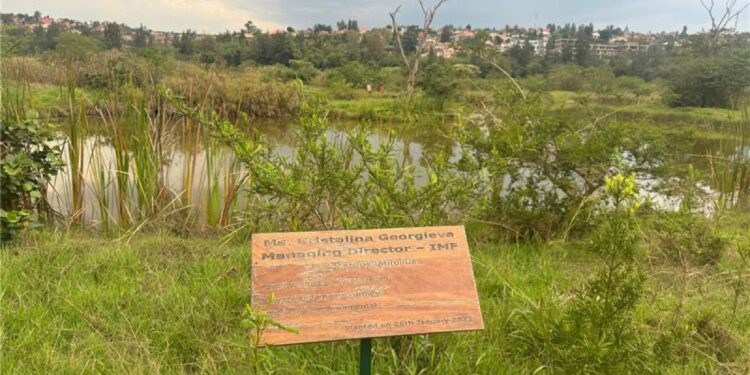KigaliRwanda provides a model for preserving biodiversity and supporting green tourism to achieve sustainable development, and taking care of human health to be able to produce and contribute to the development of the economy.
Kigali car-free zone
“Imbuga City Walk” – a car-free zone – is a clear example of the country’s approach to preserving the environment within a modern vision that prioritizes the environment and people above all else.
Imbuga City Walk is located in the heart of the central business district of the capital, Kigali, and is a green recreational space that relies mainly on walking or cycling only.
It is “an area free of cars and any other means of transportation except bicycles, designated for walking and enjoying beautiful moments away from noise and pollution,” Jean-Claude Nyabizi, one of the supervisors of this project, told Al Jazeera Net.
The project symbolizes “Rwanda’s appreciation for people’s lives and their importance, whether to Rwandans or foreign tourists… It is part of the country’s efforts to engage in a global trend to create a healthy ecosystem for the population,” Nyabizi said.
The economic importance of such projects is evident – Nyabizi asserts – in that they “enhance human health care so that they are able to work, produce, innovate, give, and thus contribute to the development and renaissance of the country.”
Another economic importance is evident in the fact that this region is “full of small commercial projects that benefit their owners on the one hand and the Rwandan economy on the other hand, and also contribute to providing an opportunity for visitors to enjoy a healthy life free of pollution.”
The area provides job opportunities for more than 400 people, and also gives guests of hotels near the area or even far away the opportunity to walk or sit in an environmentally friendly space.
The length of the walkway is about 400 meters, but there are government efforts to expand it due to its environmental and economic importance. This walkway receives about 3,500 people daily, according to the same spokesman.
Nyandongo Ecological Park
Nyandongo Park is another project to support eco-tourism in Kigali, and aims to enhance biodiversity and restore the ecosystem in degraded wetlands.
The implementation of this unique project took about 6 years, and it opened in 2022, with an investment amounting to approximately $4.6 million, according to Mwiziroa Thokhen, one of the park’s officials.
This sustainable project has improved the livelihoods of local communities by creating nearly 4,000 job opportunities for local communities, and has also provided space for tourists, students and researchers, given the environmental diversity enjoyed by this green space.
Those in charge of this project – which has an area of more than 121 hectares – believe that biodiversity not only contributes to preserving the environment, but also generates revenues for both local communities and Rwanda.
Thokhin told Al Jazeera Net that the project has 6 basic goals: environmental, recreational, educational, economic, social, and health.
He explains that preserving biodiversity is very important to face the challenges posed by climate change, and points out that this park serves as a place for visitors to relieve stress and restore balance.
Thokhin stated that this park receives about 10,000 people per month, which means achieving good annual revenues that will increase over time, pointing out that there are similar projects being implemented in many regions to preserve environmental diversity and nature in the country.
Nyamirambo Women’s Centre
A picture in the capital, Rwanda, is not complete without a visit to the Nyamirambo Women’s Centre, which is a Rwandan non-governmental organization established at the end of 2007 by 18 Rwandan women living in Nyamirambo, Kigali.
According to the project founders, the women together created a project aimed at addressing gender-based violence and non-discrimination.
The mission of the Nyamirambo Women’s Centre, according to officials there, is to provide education and vocational training to women who do not have the means to pay for this training on their own, so that they can obtain better job opportunities.
To achieve these goals, the Center seeks to strengthen the institutional and organizational capacity of the Council for women’s initiatives, empower women through capacity development and employment, in addition to promoting women’s and community tourism.
Kimironko Market
Not far from the Women’s Center is the Chemeronko Market, in the Chemeronko area, which is the busiest market in the city.
According to officials, locals from all over the city come here to buy fruits, vegetables, fabrics and other necessities.
Kimironko Market is one of the largest popular commercial markets in the capital, Kigali, and includes shops selling traditional clothes and various other goods, as well as small sewing projects.



